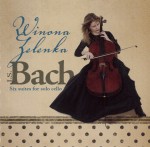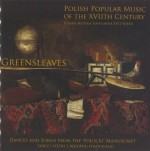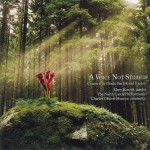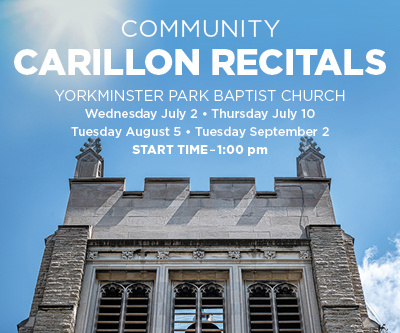TSO principal cellist Winona Zelenka has just released her recording of Bach’s Six Suites for Solo Cello (Marquis 81509). I don’t think it’s just because I am an avid amateur cellist that these pieces never seem to lose their vitality, no matter how many different versions I hear. From first exposure to Pablo Casals’ historic recordings in my formative years, through the thoughtful interpretations of Paul Tortellier, Pierre Fournier, Jacqueline Du Pré, Janos Starker and Yo-Yo Ma, to larger-than-life performances by Rostropovich, Misha Maisky and Yuli Turovsky and at the other end of the spectrum the historically informed approach of Anner Bylsma, Pieter Wispelwey and Sergei Istomin, there is always something exhilarating in hearing the suites anew. Like so much of Bach’s music, it never seems to get lost in translation – among my favourite transcriptions are Göran Söllscher’s for 10-string guitar and Marion Verbruggen’s for alto recorder and voice flute. And let us not forget Yo-Yo Ma’s multi-disciplinary approach “Inspired by Bach” which led to the creation of Toronto’s Music Garden, films by François Girard and Atom Egoyan, and collaborations with choreographer Mark Morris, skaters Torville and Dean and Kabuki actor Tamasaburo Bando produced by Toronto’s Rhombus Media.
 Zelenka’s is not the first recording by a TSO principal – Daniel Domb’s 1993 Mastersound release is still among my favourites - and evidently this is not the first to be performed on this particular cello. Zelenka is playing an instrument crafted in Cremona in 1707 by Joseph Gaurnerius currently owned by Toronto arts patrons Edward and Amy Pong. It was previously owned by Janos Starker and although not identified on the Mercury Living Presence CD reissue of Starker’s Bach Suites, I think I do recognize the distinctive sound of the instrument as being the same Zelenka is using. In the extensive liner notes she shares with us her own personal journey through the suites which started around age 10 with lessons with another TSO cellist, Bill Findlay, and listening to Casals’ recordings with her father. She describes the different approaches of her later teachers, Vladimir Orloff, Janos Starker and William Pleeth and talks about her own path of balancing these influences and incorporating the “period” ideas she has encountered during her professional career. The result is a warm and invigorating treatment of these timeless suites in a full modern sound with clean lines and tasteful ornamentation. Concert note: Winona Zelenka will perform three of the suites in a matinee concert at Glenn Gould Studio on June 6.
Zelenka’s is not the first recording by a TSO principal – Daniel Domb’s 1993 Mastersound release is still among my favourites - and evidently this is not the first to be performed on this particular cello. Zelenka is playing an instrument crafted in Cremona in 1707 by Joseph Gaurnerius currently owned by Toronto arts patrons Edward and Amy Pong. It was previously owned by Janos Starker and although not identified on the Mercury Living Presence CD reissue of Starker’s Bach Suites, I think I do recognize the distinctive sound of the instrument as being the same Zelenka is using. In the extensive liner notes she shares with us her own personal journey through the suites which started around age 10 with lessons with another TSO cellist, Bill Findlay, and listening to Casals’ recordings with her father. She describes the different approaches of her later teachers, Vladimir Orloff, Janos Starker and William Pleeth and talks about her own path of balancing these influences and incorporating the “period” ideas she has encountered during her professional career. The result is a warm and invigorating treatment of these timeless suites in a full modern sound with clean lines and tasteful ornamentation. Concert note: Winona Zelenka will perform three of the suites in a matinee concert at Glenn Gould Studio on June 6.
 The Polocki Manuscript was discovered in 1962 inside the covers of a Greek Catholic missal dated 1680. It is an invaluable documentation of popular styles in 17th century Poland containing more than 200 songs and dances, many of which had been previously lost in obscurity. It was published in a modern edition in 1970, a copy of which eventually made its way into the hands of Magdalena Tomsinska, lutenist of the Kitchener-Waterloo based Renaissance ensemble Greensleaves (www.greensleaves.com). The result is a delightful CD entitled Polish Popular Music of the XVIIth Century (Chestnut Hall Music CHM091115) which features Tomsinska along with core members Marilyn Fung (viola da gamba) and Shannon Purves-Smith (recorders and viols), with arrangements and additional instruments played by Michael Purves-Smith plus a quartet of guest vocalists. From slow and stately pavans to light and frolicking dances, love songs and sacred texts, the disc provides welcome insight into the culture of a bygone time and place. The disc was sponsored in part by the Consulate General of the Republic of Poland in Toronto. The Consulate is also involved in the presentation of “Polish Peoples’ Republic - so far away and so close by...” an exhibit commemorating another bygone era – Polish culture during the Soviet years - prepared by the Polish Institute of National Remembrance in cooperation with the University of Toronto. It runs until June 18 at the Vivian & David Campbell Conference Facility, Munk School of Global Affairs, 1 Devonshire Place.
The Polocki Manuscript was discovered in 1962 inside the covers of a Greek Catholic missal dated 1680. It is an invaluable documentation of popular styles in 17th century Poland containing more than 200 songs and dances, many of which had been previously lost in obscurity. It was published in a modern edition in 1970, a copy of which eventually made its way into the hands of Magdalena Tomsinska, lutenist of the Kitchener-Waterloo based Renaissance ensemble Greensleaves (www.greensleaves.com). The result is a delightful CD entitled Polish Popular Music of the XVIIth Century (Chestnut Hall Music CHM091115) which features Tomsinska along with core members Marilyn Fung (viola da gamba) and Shannon Purves-Smith (recorders and viols), with arrangements and additional instruments played by Michael Purves-Smith plus a quartet of guest vocalists. From slow and stately pavans to light and frolicking dances, love songs and sacred texts, the disc provides welcome insight into the culture of a bygone time and place. The disc was sponsored in part by the Consulate General of the Republic of Poland in Toronto. The Consulate is also involved in the presentation of “Polish Peoples’ Republic - so far away and so close by...” an exhibit commemorating another bygone era – Polish culture during the Soviet years - prepared by the Polish Institute of National Remembrance in cooperation with the University of Toronto. It runs until June 18 at the Vivian & David Campbell Conference Facility, Munk School of Global Affairs, 1 Devonshire Place.
 A Voice Not Stilled is the title of a Sinfonia Concertante for piano and orchestra by Michael Easton. It is also the title of the most recent disc by Toronto pianist Mary Kenedi which features a live recording of the European premiere of the work (Echiquier Records ECD-010 www.MaryKenedi.com). Extensive liner notes tell the story of this programmatic composition, based on a melody written by a victim of the Holocaust, Gabriella Kolliner, as remembered by her survivor brother many years after her death and transcribed by a nephew who never knew her. Young Peter Kolliner hoped to one day compose a set of piano variations on “Gabi’s Theme” to honour his aunt, but later met Easton, a celebrated British-Australian composer, who was moved by the story and asked permission to use the theme himself. What he created was an extended homage to the composer-turned-doctor who perished at Auschwitz, integrating the theme in a number of dramatic and moving ways in the course of the four movements of the work: In the Beginning, Flight into Darkness, Music in the Silence of the Night and A Voice Not Stilled. “Gabi’s theme” is not the only musical reference here. The second movement incorporates the Jewish prayer Kol Nidre in a clarinet solo and the third movement makes very effective use of a hauntingly beautiful line from Schumann’s Piano Quartet with “Gabi’s Theme” interwoven as a counter melody. The final movement, which begins in calm reminiscent of a Grieg sunrise, gradually builds to ecstatic runs in the piano over rising orchestral accompaniment and then ends quietly, poignantly without a final cadence, after a number of iterations by the piano of the signature theme. Kenedi is in fine form in this live performance which was greeted by a standing ovation at the House of Culture in Teplice, in the Czech Republic on April 21, 2005 and the North Czech Philharmonic shines under the baton of Charles Olivieri-Munroe. The CD also includes Kenedi performing two rarely recorded piano concertos – Scherzo Fantasque by Ernest Bloch and Rhapsody for Piano and Orchestra Op.1 by Bela Bartok.
A Voice Not Stilled is the title of a Sinfonia Concertante for piano and orchestra by Michael Easton. It is also the title of the most recent disc by Toronto pianist Mary Kenedi which features a live recording of the European premiere of the work (Echiquier Records ECD-010 www.MaryKenedi.com). Extensive liner notes tell the story of this programmatic composition, based on a melody written by a victim of the Holocaust, Gabriella Kolliner, as remembered by her survivor brother many years after her death and transcribed by a nephew who never knew her. Young Peter Kolliner hoped to one day compose a set of piano variations on “Gabi’s Theme” to honour his aunt, but later met Easton, a celebrated British-Australian composer, who was moved by the story and asked permission to use the theme himself. What he created was an extended homage to the composer-turned-doctor who perished at Auschwitz, integrating the theme in a number of dramatic and moving ways in the course of the four movements of the work: In the Beginning, Flight into Darkness, Music in the Silence of the Night and A Voice Not Stilled. “Gabi’s theme” is not the only musical reference here. The second movement incorporates the Jewish prayer Kol Nidre in a clarinet solo and the third movement makes very effective use of a hauntingly beautiful line from Schumann’s Piano Quartet with “Gabi’s Theme” interwoven as a counter melody. The final movement, which begins in calm reminiscent of a Grieg sunrise, gradually builds to ecstatic runs in the piano over rising orchestral accompaniment and then ends quietly, poignantly without a final cadence, after a number of iterations by the piano of the signature theme. Kenedi is in fine form in this live performance which was greeted by a standing ovation at the House of Culture in Teplice, in the Czech Republic on April 21, 2005 and the North Czech Philharmonic shines under the baton of Charles Olivieri-Munroe. The CD also includes Kenedi performing two rarely recorded piano concertos – Scherzo Fantasque by Ernest Bloch and Rhapsody for Piano and Orchestra Op.1 by Bela Bartok.
We welcome your feedback and invite submissions. CDs and comments should be sent to: The WholeNote, 503 – 720 Bathurst St. Toronto ON M5S 2R4. We also encourage you to visit our website, www.thewholenote.com, where you can find added features including direct links to performers, composers and record labels, “buy buttons” for on-line shopping and additional, expanded and archival reviews.
David Olds
DISCoveries Editor
discoveries@thewholenote.com



